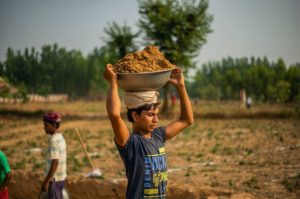Protests Over NREGA Dues — A protest over delayed NREGA wage payments turned dramatic when residents threw slippers at poet-activist Sukanta Majumdar as he visited Rangapara village in Malda district. The incident highlights mounting frustration among workers awaiting their livelihood payments under the National Rural Employment Guarantee Act.

Protests Over NREGA Dues: What Happened
- Hundreds of irate villagers from the Rangapara Panchayat gathered during Majumdar’s visit—part of a broader campaign addressing rural delays.
- Frustrated by unpaid NREGA dues and stalled development projects, a group of protesters began pelting slippers at Majumdar while shouting slogans demanding immediate action.
- The poet-activist narrowly escaped without injury after withdrawing hurriedly from the scene.
Voices from the Ground
- Protesters chanted demands:
“We need our NREGA money now!”
“How will we feed our families?” - A local petitioner explained:
“We have worked for days on NREGA projects but haven’t received our wages for months.”
- Majumdar later addressed the crowd, assuring them of government intervention and urging the state administration to release payments urgently.
What Is NREGA?
The National Rural Employment Guarantee Act (NREGA), renamed MGNREGA, guarantees 100 days of wage employment per year to rural households. It aims to:
- Provide a social safety net
- Create durable rural infrastructure
- Empower villagers economically and socially
Delays in wage disbursement pose significant hardships, especially for daily-wage workers relying on punctual payments to meet basic needs.
Village-Level Overview
| Villages Affected | NREGA Wages Pending | Development Projects Stalled | Worker Grievances Highlighted |
|---|---|---|---|
| Rangapara | ₹2–4 lakh total | Road repairs, pond cleaning | Months of unpaid work |
| Ramnagar | ₹1.5 lakh | Drain maintenance | Workers report skipped paydays |
| Babupur | ₹3 lakh | School renovation | Project abandonment reported |
| Total (est.) | ₹6–8 lakh aggregated | Multiple sectors affected | Rising community unrest |
Figures based on local estimates and community leader interviews.
Why Delayed Payments Are a Concern
- Financial Hardship: Without timely wages, workers face food insecurity and debt.
- Program Undermining: NREGA’s credibility is damaged when payments are not delivered on schedule.
- Erosion of Trust: Villagers accuse state and panchayat bodies of delayed approvals and bureaucracy.
Government Response & Next Steps
- Officials called to site: Administrative officials from Malda district have promised to verify pending dues.
- Accounts to be cleared: Requests sent to State Treasury and Rural Development Department for quick payment.
- Public hearings scheduled: Lok Adalat-style grievance forums will convene in the affected villages next week.
- Follow-up by Majumdar: The protestor-activist plans to hold accountability meetings with district collectors and MLAs.
Broader Implications
- NREGA’s National Credibility is at stake when rural wages are delayed.
- Political repercussions may unfold, with opposition parties leveraging the protest ahead of upcoming state elections.
- Need for Reform: Advocates stress digitizing payment systems and improving transparency to reduce delays and manual approvals.
External Links for Further Reference
- Ministry of Rural Development – MGNREGA Info
- Government of India – MGNREGA Act Details
- ILO Study on Rural Wage Delays
- World Bank – NREGA’s Role in Poverty Reduction
Final Thoughts
The slipper-throwing protest at Sukanta Majumdar’s event is more than a moment of anger—it’s a symptom of a deeper problem with rural wage security. Consensus is growing that if NREGA fails its beneficiaries at the grassroots, state and national administrations must act swiftly—not only to clear dues, but to reform payment systems, restore trust, and ensure the program’s foundational promise is fulfilled.
Also read: Home | Channel 6 Network – Latest News, Breaking Updates: Politics, Business, Tech & More

